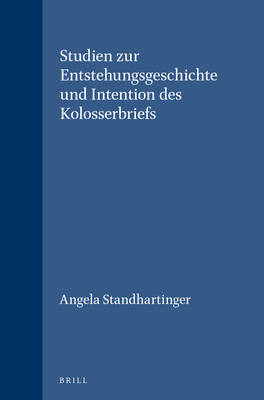
- Afhalen na 1 uur in een winkel met voorraad
- Gratis thuislevering in België vanaf € 30
- Ruim aanbod met 7 miljoen producten
- Afhalen na 1 uur in een winkel met voorraad
- Gratis thuislevering in België vanaf € 30
- Ruim aanbod met 7 miljoen producten
Zoeken
Studien Zur Entstehungsgeschichte Und Intention Des Kolosserbriefs
Angela Standhartinger
€ 387,95
+ 775 punten
Omschrijving
This volume examines the Epistle to the Colossians as a pseudepigraphic letter. It is concerned with how different traditions associated with Paul and his thought were appropriated by Pauline communities in the aftermath of his death. Extensive attention is paid to the possibility of Colossians' interaction with oral traditions, which includes consideration of the oral context for Paul's own correspondence and ministry. In recovering these traditions, Colossians creates a heavenly letter and a testament, designed so as to assure readers of the apostle's ongoing aid and to interpret the theological significance of his death. The analysis of different literary and rhetorical characteristics of Colossians (pseudephigraphy, orality, etc.) is placed within the context of both contemporaneous Jewish (esp. Sapiential) traditions and the traditions of the Greco-Roman philosophic schools. One chapter deals with the origin and purpose of the 'Haustafel'.
Specificaties
Betrokkenen
- Auteur(s):
- Uitgeverij:
Inhoud
- Aantal bladzijden:
- 374
- Taal:
- Duits
- Reeks:
- Reeksnummer:
- nr. 94
Eigenschappen
- Productcode (EAN):
- 9789004112865
- Verschijningsdatum:
- 1/12/1998
- Uitvoering:
- Hardcover
- Formaat:
- Genaaid
- Afmetingen:
- 166 mm x 246 mm
- Gewicht:
- 820 g

Alleen bij Standaard Boekhandel
+ 775 punten op je klantenkaart van Standaard Boekhandel
Beoordelingen
We publiceren alleen reviews die voldoen aan de voorwaarden voor reviews. Bekijk onze voorwaarden voor reviews.








